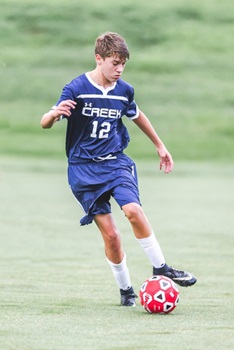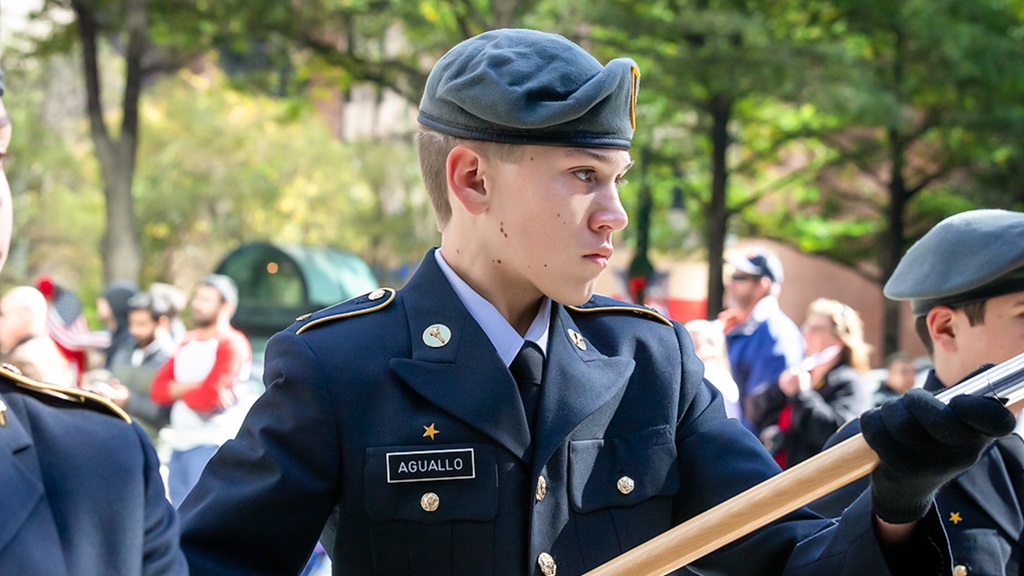Like many young teens, Ben Aguallo is full of energy. He enjoys soccer, Junior ROTC and playing outside with friends. But just 8 years ago during Spring Break, Ben’s parents were concerned when 6-year-old Ben started acting lethargic all of a sudden. Soon enough, he was nauseous and vomiting. Initially thinking he might have a stomach flu, the sickness persisted to a point where they knew his illness was more serious.
With their concerns growing, Ben’s parents took him to him to his primary care physician to see what was wrong. When they took a urine sample, they were shocked to find that Ben’s urine was brown — “the color of Coca-Cola,” his mom, Beth, recalls. Something wasn’t right, and the doctors got to work figuring out a diagnosis.
A rare disease — without treatment
After a visit with his primary care provider, Ben was referred to Donald “Jack” Weaver, MD, PhD, a pediatric nephrologist at Levine Children’s Hospital. He diagnosed Ben with atypical hemolytic uremic syndrome (aHUS), an extremely rare genetic disease that disrupts kidneys from functioning normally. In aHUS, the walls of blood vessels in the kidneys become clogged with platelets, clotting up kidney function.
“As a result of these clots, kids with aHUS can commonly go into kidney failure,” explains Dr. Weaver. Consequently, aHUS has a mortality rate as high as 25 percent, according to aHUS Alliance Action.
Given the gravity of this diagnosis, Ben and his parents were eager to get Ben healthy. But at the time of Ben’s diagnosis, no treatment for aHUS had been approved by the FDA.
Treatment options arise
At first, Ben had plasma exchanges performed five times a week to clean his blood as a treatment for his illness. But this process was time-consuming and often left Ben feeling nauseous. Eventually, in December of 2010, he was experiencing allergic reactions from the plasma exchange and his treatment was adjusted.
He continued this time-intensive treatment until 2012, when an aHUS treatment was finally approved by the FDA. Ben immediately started on the new drug, which required him to visit LCH every two weeks for about an hour and a half for infusions and monitoring.
Although doctor visits every other week still took up time, Ben and his family were able to work the appointment into their schedule, taking him to LCH before school or during lunchtime. Best of all, he was back on the soccer field, active and energetic once again.
A new opportunity
While the new treatment was going well for Ben, he and his parents were always looking for alternative treatment options that could help improve Ben’s quality of life. So you can imagine their excitement when they learned Ben was eligible to take part in a national Phase 3 clinical trial that could reduce his hospital visits from every two weeks to every two months.
The drug being tested in this clinical trial is a reformulated version of the FDA-approved drug. And given the rare nature of the disease, Ben is the only patient at LCH taking part in this clinical trial.
“Once a patient has signed consent to participate in a clinical trial, we start a screening period where we confirm that the patient meets the trial’s criteria,” says LCH clinical research nurse Hollister Dibble, RN. “By now of course we’re familiar with Ben and his family — and they’ve been anxiously awaiting Ben’s chance to be a part of something like this.”
Ben is the only patient at LCH in the study and is just one of nearly 30 participating in the trial worldwide, which will run until 2021. Then it’s a question of whether or not the drug gets approved. One of the main draws of such a study is the fact that, while the drug is in the trial phase, it costs nothing. This is especially important for people with aHUS given the fact that the current treatment is one of the most expensive drugs available due to the disease’s rarity.
Happy days ahead
The new study is giving Ben and his family new hope for an improved quality of life. “With Ben, you wouldn’t know there’s anything wrong,” says Beth. “He’s like any other kid.” Ben and his family are very grateful for the Pediatric Nephrology Center of Excellence at Levine Children’s for providing advanced treatment options for such a rare disease.
But the gratitude works both ways. “Ben is helping future patients by taking part in this trial,” says Dr. Weaver. With a rare disease like aHUS, treatment developments can move slowly and lack funding. That’s why trials like this one are so important — and could go on to improve the lives of so many down the road.
For now, Ben and his family are just happy to spend a little less time at the doctor’s office. “I was recently talking to Ben’s mother, and it finally dawned on her that she and her family can go on vacation now,” says Dibble. “His study treatment schedule allows for increased flexibility, so that frequent infusion no longer dictate what Ben and his family can or can’t do.”
Visit our site to learn more about pediatric nephrology care at Levine Children’s Hospital.



